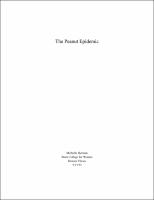Please use this identifier to cite or link to this item:
https://hdl.handle.net/20.500.12202/8265| Title: | The Peanut Epidemic |
| Authors: | Alayev, Anna Herman, Michelle |
| Keywords: | peanut allergy overprotection of children |
| Issue Date: | 17-May-2022 |
| Publisher: | Yeshiva University |
| Citation: | Herman, M. (2022, May 17). The Peanut Epidemic. Undergraduate honors thesis, Yeshiva University. |
| Series/Report no.: | S. Daniel Abraham Honors Student Theses;May 17, 2022 |
| Abstract: | Over 10% of the population in Western countries suffer from allergies, 8% of that being children and 2% of that being adults. These statistics were found by The Division of Allergy and Immunology of the University of Pennsylvania School of Medicine in 2019. At the time of the study it was stated that these numbers were most likely to rise, so the population of persons with allergies is presumably significantly larger today. Another contributing factor to a likely higher percentage of the population suffering from allergies than reflected in the study is that the study does not include people who have not been diagnosed with an allergy. These people have not yet been diagnosed either because they have yet to be exposed to an allergen or because they have not sought out treatment. Despite the numbers only representing some of the population who have allergies over the past ten years, (XIII) the number of peanut allergies diagnosed in America has increased by 3.5 fold. This increase is extremely significant and it means there is something contributing to the rise of diagnoses of allergies. There are many factors which this rise can be attributed to, including the rise in access to doctors for the general population as well as increasing levels of cleanliness in our living environment which means that when one is exposed to a threatening substance it causes a more adverse reaction. Though these reasons may have had an effect on the increase in allergy prevalence in general, there must be some other reason for the striking increase in peanut allergies specifically within the American population. This sharp rise in the diagnosis of peanut allergies correlates with the overprotection of American children whose parents do not allow them to eat peanuts until middle or late childhood. The reasons for the overprotection of American children is a result of the obsolete advice of physicians regarding peanuts compounded with the general attitude of parents sheltering their children in America. |
| Description: | Undergraduate honors thesis / Open access |
| URI: | https://hdl.handle.net/20.500.12202/8265 |
| Appears in Collections: | S. Daniel Abraham Honors Student Theses |
Files in This Item:
| File | Description | Size | Format | |
|---|---|---|---|---|
| Michelle Herman OA Peanut May2022.pdf | 266.37 kB | Adobe PDF |  View/Open |
This item is licensed under a Creative Commons License

